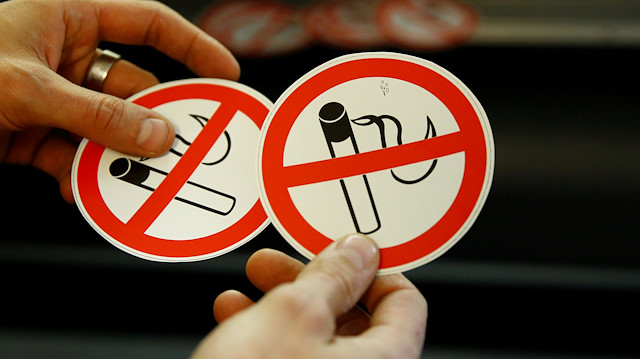Quit smoking while there's still time: Doctor

If you want to quit smoking, quit immediately, because your body may not have enough time to recover, doctor advises
National No Smoking Day in Turkey is celebrated Feb. 9, to draw attention to the dangers of tobacco.
Tobacco use is an important risk factor for developing cancer, the disease that kills eight million people worldwide each year.
To mark the occasion, Anadolu Agency spoke with doctors about what happens to the body of smokers and how it recovers when one stops the habit.
“Smoking is the most important cause of chronic obstructive pulmonary disease (COPD), the fourth most common disease of death in the world,” said Dr. Ece Yigit of Pendik Medipol University Hospital in Istanbul.
COPD is a disease that can be controlled, but it cannot be eliminated permanently. But when smoking is stopped the disease’s progression stops.
“When smoking is stopped, circulation of body improves, oxygen-rich blood is carried to the cells and organ functions improve,” said Yigit.
She said smoking causes arteriosclerosis, or a thickening of the walls of the arteries, and erection loss. But once one stops, the risk of heart attack and strokes are reduced and there is a visible improvement in sexual function.
Dr. Muhammed Emin Akkoyunlu referred to the World Health Organization (WHO) that said smoking is an epidemic that causes the greatest harm to humanity.
The cardiac expert at Medipol Mega University Hospital in Istanbul concurs with that assessment for two reasons.
First, it accepts that using tobacco is an illness. And secondly, the WHO contends that smoking damages more people than Mers-CoV, SARS or the great plague which wreaked havoc globally in the middle ages.
“After quitting smoking, the damage caused by cigarette to be repaired by the body is a process that takes 10 years,” he said.
His advice: if you want to quit smoking, quit immediately, because your body may not have enough time to recover.
Dr. Bilal Boztosun, who heads the cardiology department at Medipol, said when one quits smoking, pulse rates and blood pressure begin to drop in 20 minutes. And in the first 12 hours, the level of carbon monoxide in the body return to normal levels.
Two weeks after quitting, up to 30% improvement in lung function occurs, he said.
Another chest disease specialist, Mehmet Bayram, said regardless of how long one smoked, significant improvements begin with the cessation of cigarettes and tobacco products.
As soon as one quits smoking, their bodies begin to heal in the following ways:
- One hour
Heart rate drops in as little as 20 minutes and returns to normal.
- 12 hours
Cigarettes contain dangerous toxins, including carbon monoxide gas that can cause potentially lethal poisoning.
At high doses, it can be dangerous or lethal, because it prevents the absorption of oxygen into the lungs and blood. In a short time, suffocation might occur due to a lack of oxygen when inhaled in large doses.
The body cleanses itself from excess carbon monoxide after 12 hours without a cigarette. Additionally, when carbon monoxide levels return to normal, oxygen levels increase.
- One day
The risk of heart attack begins to decrease just 24 hours after quitting smoking.
Smoking increases the risk of developing coronary heart disease by lowering good cholesterol, therefore, the heart cannot exercise healthy. Smoking also increases blood pressure and blood clots, which increases the risk of stroke.
Blood pressure begins to decrease within as little as one day, reducing the risk of heart disease from high blood pressure caused by smoking. Oxygen levels would have increased in that short time, making physical activity and exercise easier to perform, encouraging heart-healthy habits.
- Two days
Smoking damages nerve endings such as smell and taste senses. One may notice a heightened sense of smell and more vivid tastes, because the nerves heal within just two days.
- Three days
Nicotine levels inside body decrease to minimum levels in three days. Although having no nicotine is healthier, the initial depletion may cause the withdrawal of nicotine. After three days, most experience moodiness, irritability, severe headaches and deprivation while the body readjusts.
- Seven days
There are very important cells on the inner surface of the nose and in the bronchi that hold and clean harmful particles while breathing. The cells of smokers, unfortunately, cannot work adequately.
In about seven days, cells begin to work again and discard accumulated harmful particles in the respiratory. The process causes a cough. Many think quitting increases coughing and phlegm, but it is a good reaction for the immune system in the convalescent period. The body tries to discard harmful particles by coughing.
- One month
Lung function begins to recover within as little as one month. When lungs heal and lung capacity recover, former smokers will notice less coughing and shortness of breath. As athletic endurance improves, former smokers will notice a greater capacity for cardiovascular activities such as jumping and running.
Cookies are used limited to the purposes of the Law on the Protection of Personal Data No. 6698 and in accordance with the legislation. For detailed information, you can review our cookie policy.







Comments you share on our site are a valuable resource for other users. Please be respectful of different opinions and other users. Avoid using rude, aggressive, derogatory, or discriminatory language.
Yükleniyor...